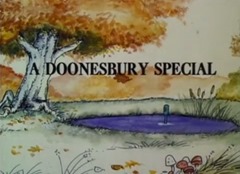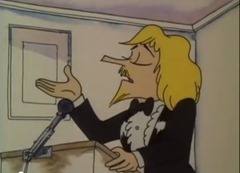 ‘Tis the season for holiday specials, and one of the more obscure yet entertaining ones you will find is the Oscar-nominated “A Doonesbury Special” from 1977. Nominated for Best Animated Short, this half-hour TV special features the Doonesbury gang looking back at the just-ended hippie movement and trying to figure out where it all went and make sense of where they are now.
‘Tis the season for holiday specials, and one of the more obscure yet entertaining ones you will find is the Oscar-nominated “A Doonesbury Special” from 1977. Nominated for Best Animated Short, this half-hour TV special features the Doonesbury gang looking back at the just-ended hippie movement and trying to figure out where it all went and make sense of where they are now.
I bring it up, because it seems like the big publishers and the Authors Guild are in a similar boat. They’re looking back at the era when they dominated publishing—they were the great gatekeepers, and the only “self-publishing” was the mug’s game of vanity press, in which you had to pay far too much for far too few books that you then sold yourself—and blinking blearily in the new sun lighting up a landscape wherein 25% of the top 100 Kindle books were self-published and Amazon has the whip hand.
You can see it in articles like this piece featuring Joe Konrath and Barry Eisler gleefully defenestrating an Authors Guild recruitment letter from Scott Turow and Richard Russo. The letter exhorts writers to join the Authors Guild because it’s one of the only groups left that is willing to stand up to mean and nasty ol’ Amazon. Russo complains of “the scorched-earth capitalism of companies like Google and Amazon, [and] spineless publishers who won’t stand up to them,” but, Konrath and Eisler note, this principled stand against Amazon hasn’t exactly stopped either Turow or Russo from continuing to sell their books through it.
Barry: Yeah, this one always astonishes me. I mean, just because you’re being hypocritical, it doesn’t mean ipso facto you’re wrong, but… this letter is supposed to persuade people to join the “Authors Guild” and its mission of standing up to a company that practices “scorched-earth capitalism” and seeks “world domination” and glories in “burying your competitors and then burying the shovel.” And the guys who are leading that charge… sell their books through the very company in question. Who are they trying to inspire with their noble example?
Richard and Scott, you’ve both said many times how you’re set for life, the revolution can’t affect you, your intentions are purely altruistic, etc. So what’s keeping you from instructing your publishers to pull your existing books from, and to stop offering your new books with, Amazon? How can you presume to lecture others about what sacrifices they should make in their own businesses when you’re so nakedly unwilling to put your own money where your mouths are?
As one of the commenters on the Passive Voice discussion of the piece notes, it’s not even a fair fight. Of course, to some extent if you’re on one side, of course the other side’s arguments are going to look silly, but everything Turow says comes from the point of view of the need to cling desperately to the old ways of making money and keep propping up that old business model, rather than exploring the new models that can earn authors more money. Granted, not everyone (indeed, not most people) is going to be a Joe Konrath-level success story, but anyone who is not already a bestseller has a better chance of eking out some kind of a living that way than of hoping a traditional publisher will “discover” them in the slush pile.
And let’s not forget that it was the Authors Guild’s, and hence the big publishers’, concentration on the Google Books scanning issue to the exclusion of all else that gave Amazon the opening to become the 800 lb gorilla of the bookselling world to begin with. They talk a good game about standing up to Amazon, but their jumping at the wrong shadows helped make Amazon what it is!
And speaking of Amazon, here we see Liz Bury on the Guardian’s Books Blog discussing this essay in Harpers by ex-Amazon employee James Marcus. In reviewing Brad Stone’s book about Amazon, Marcus decries Amazon’s cut-throat hardline business practices designed to squeeze every last possible discount and concession out of its suppliers all in the name of “delighting its customers.”
Marcus writes:
Ah, the customer — that delicious, discerning, weak-willed figure! For Bezos, the customer is everything: a comrade, a dependent, and a kind of theological entity, on whose altar almost any sacrifice is reasonable. If you can deliver the lowest prices and widest selection and speediest shipping, won’t your customer forgive just about anything? Speaking as one (and how), I can say that the answer is no. If the choice is between paying an extra two dollars for a paperback and putting an entire industry to the torch, I’m willing to ante up.
I’m not so sure I’d exactly classify Marcus as your average customer, though. As an industry insider, naturally he’s going to have different perspectives on things than the ordinary folks who pinch pennies right down to the point of spending more time than the money it saves them is worth looking for gas stations that are a few cents a gallon cheaper than others.
In discussing this essay, Liz Bury notes:
But Amazon’s aggressive style of doing business is nothing new. What astonishes me is the continuing ability of publishers to underestimate how radically Amazon has changed the industry.
Publishers, Bury writes, are in such “denial” that pundits like Mike Shatzkin have to be careful what they say. In one of his columns, Shatzkin noted that we still don’t know very much about what goes on inside Amazon, due to the company’s reticence to provide figures,
What that means is that we are developing two publishing businesses. One of them includes all of us: all the publishers, all the retailers, all the industry bodies counting books and sales. And one of them is “private” or “proprietary”; it is Amazon. They are publishing an unknown number of titles selling an unknown number of copies netting an unknown number of dollars under a numbering system nobody else can crack or track.
 And yet we still see publishers trying to act as if it’s business as usual, and all they have to do is somehow “put Amazon in its place” and carry on. Even the illegal collusion with Apple was an extension of the way publishers had been used to doing business, since they were already used to talking with each other to stagger their book releases so bestsellers wouldn’t have to compete with each other. They’re just like the Doonesbury gang in that special, still living together in a commune that has become “passé” as the world has moved on without them.
And yet we still see publishers trying to act as if it’s business as usual, and all they have to do is somehow “put Amazon in its place” and carry on. Even the illegal collusion with Apple was an extension of the way publishers had been used to doing business, since they were already used to talking with each other to stagger their book releases so bestsellers wouldn’t have to compete with each other. They’re just like the Doonesbury gang in that special, still living together in a commune that has become “passé” as the world has moved on without them.
Will publishers ever try something radical (but legal) like withdrawing all their books from Amazon cold turkey? Will they get over complaining about lower prices and figure out a way to work with them instead, the way Konrath and other self-publishers have? Or will they just keep stumbling around in the dark, confused that it’s not still the 1990s and they’re not still the undisputed rulers of their little world?
If the publishers should prove unable to cope and end up going under, it will be said, but it will not necessarily be the great all-consuming end-of-literature-in-our-time tragedy that some play it up as. Nobody misses all the copyist monks that the printing press put out of business. Something sprang up to replace them, and something will spring up to replace the traditional publishers, too. As long as people are still willing to read, there will be people who can figure out how to get the stuff they want to read to them. They may not look much like the way it was done twenty years ago, or is done today, but they will be there.































